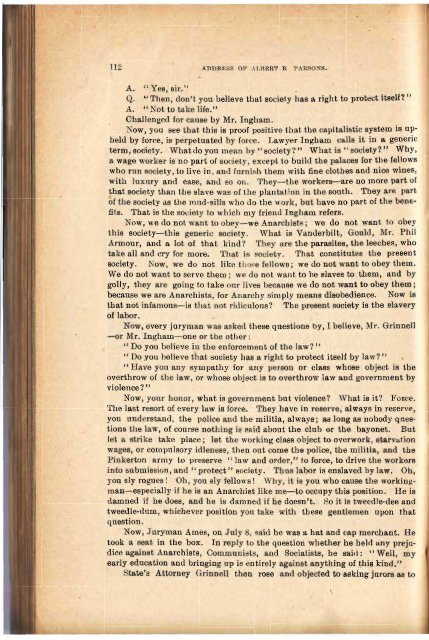The Chicago Martyrs by John P. Altgeld
The Chicago Martyrs by John P. Altgeld
The Chicago Martyrs by John P. Altgeld
You also want an ePaper? Increase the reach of your titles
YUMPU automatically turns print PDFs into web optimized ePapers that Google loves.
112<br />
ADDRESS OF AT,BERT R PARSONS.<br />
ADDRESS OF ALBERT R. PARSONS.<br />
113<br />
A. "Yes, sir." .<br />
Q. "<strong>The</strong>n, don't you believe that society has a right to prote~t itself?"<br />
A. " Not to take life."<br />
Challenged for cause <strong>by</strong> Mr. Ingham.<br />
Now, you see that this is proof positive that the capitaliBtic system is u~held<br />
<strong>by</strong> force, is perpetuated <strong>by</strong> force. I_awyer In~ham calls it in a genenc<br />
term, society. What do you mean <strong>by</strong> " society?" What is " society?" Why,<br />
a wage worker is no part of society, except to build the palaces for t~e fel.lows<br />
who run society, to live in, and furnish them with fine clothes and mce wmes,<br />
with luxury and ease, and so on. <strong>The</strong>y-the workers-are no more part of<br />
that society than the slave was of the plantation in the south. <strong>The</strong>y are part<br />
of the society as the mud-sills who do the work, but have no part of the benefits.<br />
That is the society to which my friend Ingham refers.<br />
Now, we do not want to obey-we Anarchists; we do not want to obe~<br />
this society-this generic society. What is Vanderbilt, Gould, Mr, Phil<br />
Armour, and a lot of that kind? <strong>The</strong>y are the parasites, the leeches, who<br />
take all and cry for more. That is society. That constitutes the present<br />
society. Now, we do not like those fellows; we do not want to obey them.<br />
We do not want to serve them: we do not want to he slaves to them, and <strong>by</strong><br />
golly, they are going to take ~ur lives because we do not want to obey them;<br />
because we are Anarchists, for Anarchy simply means disobedience. Now is<br />
that not infamous-is that not ridiculous? <strong>The</strong> present society is the slavery<br />
of labor.<br />
Now, every juryman was asked these questions <strong>by</strong>, I believe, Mr. Grinnell<br />
,-or Mr. Ingham-one or the other:<br />
"Do you believe in the enforcement of the law?"<br />
"Do you believe that society has a right to protect itself <strong>by</strong> law?"<br />
" Have you any sympathy for any person or class whose object is the<br />
overthrow of the law, or whose object is to overthrow law and government <strong>by</strong><br />
violence? "<br />
Now, your bonor, wbat is govemment but violence? \Vbat is it? FOlice.<br />
<strong>The</strong> last resort of every law is force. <strong>The</strong>y have in reserve, always in reserve,<br />
you understand. the police and the militia, always; as long as nobody q uestions<br />
the law, of course nothing is saidabout the club (ill' the bayonet. But<br />
let a strike take place; let the working class object to overwork, starvation<br />
wages, or compulsory idleness, then out come the police, the militia, and the<br />
Pinkerton army to preserve "law and order," to fOI'ce, to drive tbe workers<br />
into submission, and" protect" society. Tbus labor is enslaved <strong>by</strong> law. Oh,<br />
you sly rogues! Oh, you sly fellows! Why, it is you who cause the workin/!.<br />
man-especially if he is an Anarchist like me-to occupy this position. He is<br />
damned if he does, and he is damned if he doesn't. So it is tweedle-dee and<br />
tweedle-dum, whichever position you take with these gentlemen upon that<br />
question.<br />
Now, Juryman Ames, on July 8, said he was a bat and cap merchant. He<br />
took a seat in the box. In reply t.o the question whether he held any prejudice<br />
against Anarchists, Communists, and Socialists, he sai,l: "Well, my<br />
early education and bringing up is entirely against anything of this kind."<br />
State's Attorney Grinnell then rose and objected to asking jurors as to<br />
their prejudice against Anarchy, Communism, and Socialism. ~ou see, Mr.<br />
Grinnell thought if he could only get that man-that kind of a fellow-on the<br />
jury, wouldn't it be a fine thing? He doesn't want that kind of a man asked<br />
the question. A fellow that was against all this sort of stuff and this ki.nd of<br />
thing-he knew that tha.t kind of a man would be solid for hanging a man<br />
that held such ideas. I suppose that was his idea; I don't know what else he<br />
could have objected for. Mr. Grinnell said in that connection: "This is a<br />
charge of murder. This question of Anarchy is here too much." You remember<br />
this, gentlemen. " We are here to try these men for murder, and not<br />
because'they are Anarchists." This was the second day of the trial, mind<br />
you. That was Mr. Grinnell; but be was careful to aek everyone of the jurymen<br />
if they had any sympathy, to ask them if they were in favor of the labor<br />
movement; if they were' members of a labor union; if they were members of<br />
a trades union-he was very particular to find that out-and in arguing the<br />
case before the jury he and his assistants finally declared that Anarchy was<br />
,on trial, and that was the thing we must be conwcted of.<br />
H. E. Graves was a railroad superintendent.'<br />
Q. "Are you opposed to labor unions or prejudiced against members of<br />
labor organizations?"<br />
.A. "I am; . I a.m opposed to labor organizations of any and all<br />
descriptions."<br />
Judge Gary inquired of him as follows:<br />
Q. "You believe in individualism-that is; everyone, whether-a capitalist<br />
or a laborer, acting for himself, do you-yon are opposed to combination?<br />
"<br />
A. " Yes, sir."<br />
Attorney Foster-" Do you believe in railroad pools'?"<br />
A. "Yes, sir."<br />
He was laughed out of the court room. Now, Judge Gary, in his qul'stions<br />
to tbis man, teaches us individualism. Now, that is Anarchy, pure<br />
and simple.<br />
<strong>The</strong> Court-Do you take that from any short-hand report?<br />
Mr. Parsons-Yes, sir.<br />
Mr. Foster-That is true, so far as the answer of the witness is concerned.<br />
<strong>The</strong> Court-It don't sound like anything I would say.<br />
Mr. Parsons-Do you believe in individualism, every one, whether capitalist<br />
or laborer, acting for himself, do you'? Your honor. I took that down<br />
at the time you said it. I did not take it from the short-hand reports.<br />
<strong>The</strong> Court-I don't care. Go op.<br />
Mr. Foster-What I have reference to is what the juror answered.<br />
<strong>The</strong> Court-My own language is cited there. I don't remember it now,<br />
but it is of no consequence. Go on.<br />
Mr. Parsons-If everyone acted for himself, as the judge says, that<br />
would be liberty, and liberty is the end of authority, of government and of<br />
tatute lawll.<br />
.July I:l.-.Tnryman Reed, a State street music dealer. Attorney Ingham<br />
MI\yH: "I r tho prieoDers are jl:uilty you want them convicted; and if they are<br />
hlllu( lilt 011 1Vl\lIt them 1\('qnitte
















